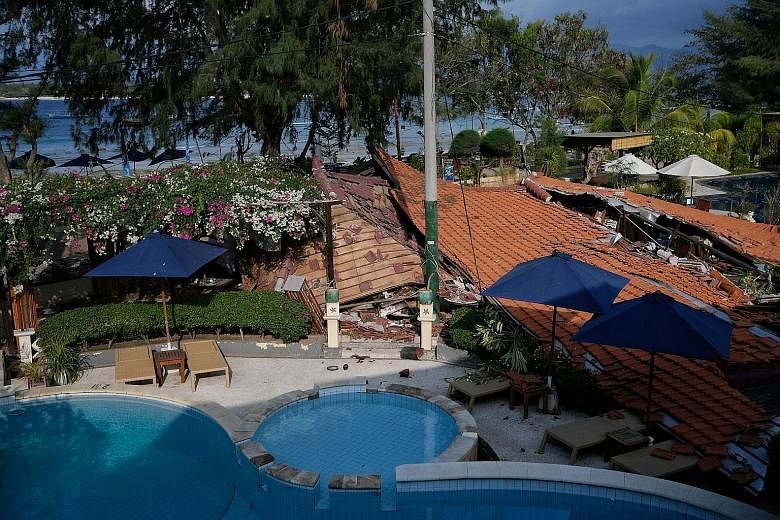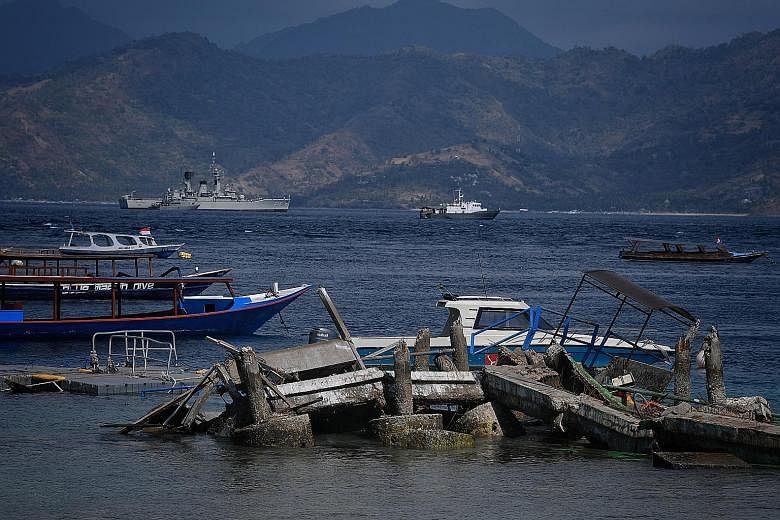Residents in Lombok, located beside the island of Bali, remained on edge yesterday as they continued to be hit by daily aftershocks since Sunday's powerful earthquake, even as they try to rebuild their lives.
Parts of the main Lombok island have had electricity restored, leading some to hope that the worst was over. Then, a magnitude-6.2 aftershock hit yesterday afternoon, shattering their hopes.
On the small island of Gili Trawangan, off the main island of Lombok, hotels, cottages and diving schools said on Wednesday that they have started to rebuild and clean up, hopeful that the worst was over and that tourists would start coming in again in the coming months.
Popularly called Gili T, the island boasts more than 300 hotels, cottages and small villas, including those operated by foreign nationals. It is the most frequently visited island by tourists among the three Gili islands.
After Sunday night's magnitude-7 quake, electricity was cut off and the water supply system was damaged. The utilities had not been restored as of Wednesday.
The island's main jetty had also collapsed, forcing incoming boats to land on the beach to evacuate tourists or bring in fresh supplies.
Some hotels painted an optimistic view of the future, saying they were betting on the island's ageless charms, including the breathtaking sunset views and opportunities to snorkel with passing sea turtles.
Mr Matteo Balderi, manager of the Dreamdivers hotel, told The Straits Times on Wednesday that he would address the post-earthquake challenges quickly.
"Our rooms are still more than fine. But we face a lack of water and, of course, electricity. If a tourist wants to come here (now)... he is always welcome," Mr Balderi said.
For conditions to return to normal, he said, visitors might have to wait until early next month.
Building structures on Gili T, like in many parts of Lombok, were mostly not designed to withstand earthquake forces.
Another hotel manager, Mr Bagoes Janaka, said his staff who arrived back on the island on Wednesday had not checked all the rooms to see whether water pipes and electricity lines were damaged.
"At least some of the rooms could be offered to visitors in three months' time. We also need time to repair the annexed restaurant whose roof collapsed," Mr Bagoes told ST. "The kitchen is badly damaged."
Lombok was last hit by a powerful quake on Jan 20, 2004, measuring magnitude-6.2, according to Indonesia's Volcanology and Geological Disaster Mitigation Centre.
On the main island of Lombok yesterday morning, just before the magnitude-6.2 aftershock in the afternoon, the restoration of electricity in many areas since Sunday's quake had provided reassurance.
At the Gunung Sari wet market in West Lombok, more residents showed up to buy their daily needs.
"This is one-third of the normal crowd. Yesterday, we saw one-quarter of the normal," said vegetable seller Muhammad Badrul Huda.
To play it safe, traders had opted to set up makeshift shops outside the market building.
"On normal days, this is where motorcycles, cars and horse-ridden carriages park. Now, they have turned it into a market," Ms Adit, a shopper, told ST.
More hotels in the provincial capital of Mataram have also started to accept visitors, a quick check yesterday found.
Most hotels previously rejected visitors on worries of tremors that could jeopardise the guests' safety.
But there are major concerns too in some parts of the province, including over the fate of residents who were made homeless after their houses were flattened in the quake.
Additionally, some shelters in remote North Lombok regency have complained of the slow delivery of aid, increasing the risk of the spread of diseases.
Villager Adi Susanto, 30, from Sokong village, one of those suffering from the slow delivery of aid, said the village has no stock of medicines, especially those to treat children with diarrhoea and fever.
"There are many children here. They are prone to those (illnesses) as we sleep outside. We also need more blankets," he said.
There have been complaints too that food aid meant for the interior of North Lombok was intercepted and taken away by other evacuees along the road. "When food comes, the priority is for the children and women. Sometimes, the men eat only once a day," said an evacuee at a shelter in Sokong village.
There was also a complaint that the Social Affairs Ministry set up a public kitchen only yesterday morning - four days after the quake, said Mr Muhammad Sultan, 25, a resident of Manggala village in North Lombok. Tents were distributed a day earlier, but the village still needs more, he added.


